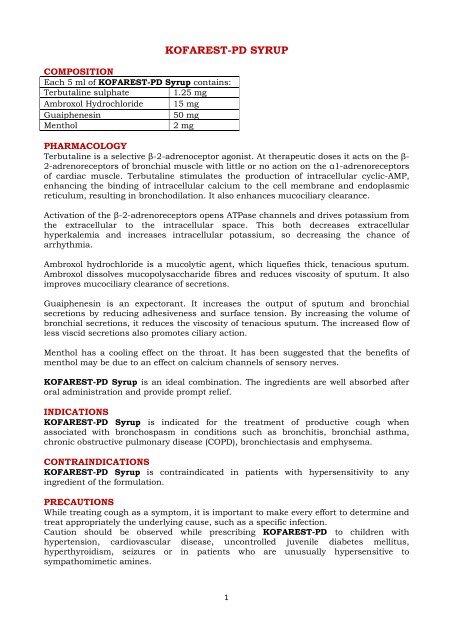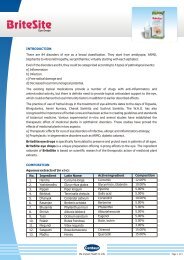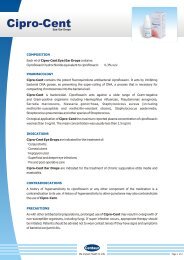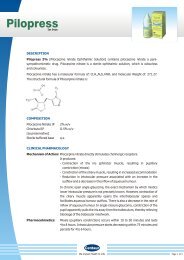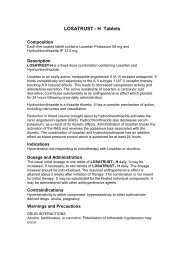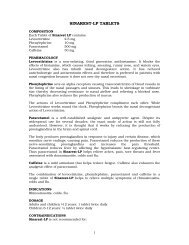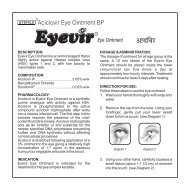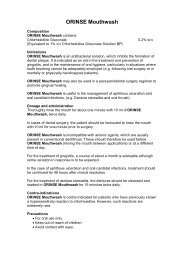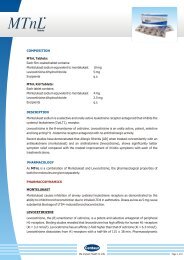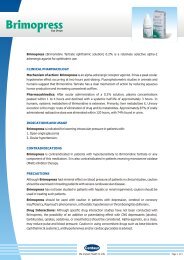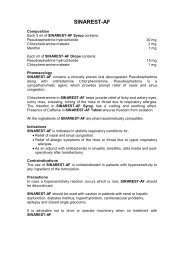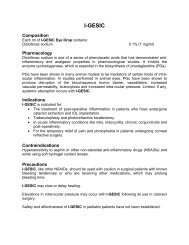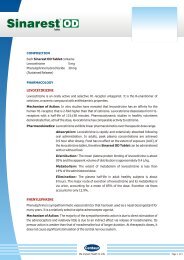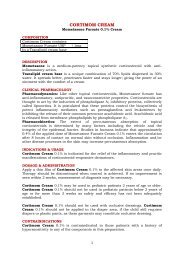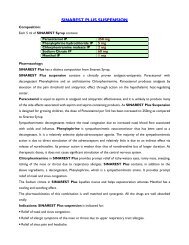KOFAREST-PD SYRUP
KOFAREST-PD SYRUP
KOFAREST-PD SYRUP
Create successful ePaper yourself
Turn your PDF publications into a flip-book with our unique Google optimized e-Paper software.
<strong>KOFAREST</strong>-<strong>PD</strong> <strong>SYRUP</strong><br />
COMPOSITION<br />
Each 5 ml of <strong>KOFAREST</strong>-<strong>PD</strong> Syrup contains:<br />
Terbutaline sulphate<br />
1.25 mg<br />
Ambroxol Hydrochloride 15 mg<br />
Guaiphenesin<br />
50 mg<br />
Menthol<br />
2 mg<br />
PHARMACOLOGY<br />
Terbutaline is a selective β-2-adrenoceptor agonist. At therapeutic doses it acts on the β-<br />
2-adrenoreceptors of bronchial muscle with little or no action on the α1-adrenoreceptors<br />
of cardiac muscle. Terbutaline stimulates the production of intracellular cyclic-AMP,<br />
enhancing the binding of intracellular calcium to the cell membrane and endoplasmic<br />
reticulum, resulting in bronchodilation. It also enhances mucociliary clearance.<br />
Activation of the β-2-adrenoreceptors opens ATPase channels and drives potassium from<br />
the extracellular to the intracellular space. This both decreases extracellular<br />
hyperkalemia and increases intracellular potassium, so decreasing the chance of<br />
arrhythmia.<br />
Ambroxol hydrochloride is a mucolytic agent, which liquefies thick, tenacious sputum.<br />
Ambroxol dissolves mucopolysaccharide fibres and reduces viscosity of sputum. It also<br />
improves mucociliary clearance of secretions.<br />
Guaiphenesin is an expectorant. It increases the output of sputum and bronchial<br />
secretions by reducing adhesiveness and surface tension. By increasing the volume of<br />
bronchial secretions, it reduces the viscosity of tenacious sputum. The increased flow of<br />
less viscid secretions also promotes ciliary action.<br />
Menthol has a cooling effect on the throat. It has been suggested that the benefits of<br />
menthol may be due to an effect on calcium channels of sensory nerves.<br />
<strong>KOFAREST</strong>-<strong>PD</strong> Syrup is an ideal combination. The ingredients are well absorbed after<br />
oral administration and provide prompt relief.<br />
INDICATIONS<br />
<strong>KOFAREST</strong>-<strong>PD</strong> Syrup is indicated for the treatment of productive cough when<br />
associated with bronchospasm in conditions such as bronchitis, bronchial asthma,<br />
chronic obstructive pulmonary disease (CO<strong>PD</strong>), bronchiectasis and emphysema.<br />
CONTRAINDICATIONS<br />
<strong>KOFAREST</strong>-<strong>PD</strong> Syrup is contraindicated in patients with hypersensitivity to any<br />
ingredient of the formulation.<br />
PRECAUTIONS<br />
While treating cough as a symptom, it is important to make every effort to determine and<br />
treat appropriately the underlying cause, such as a specific infection.<br />
Caution should be observed while prescribing <strong>KOFAREST</strong>-<strong>PD</strong> to children with<br />
hypertension, cardiovascular disease, uncontrolled juvenile diabetes mellitus,<br />
hyperthyroidism, seizures or in patients who are unusually hypersensitive to<br />
sympathomimetic amines.<br />
1
Since mucolytics, such as ambroxol, may disrupt the gastric mucosal barrier,<br />
<strong>KOFAREST</strong>-<strong>PD</strong> Syrup should be used with care in patients with a history of peptic<br />
ulceration.<br />
Pregnancy & Lactation<br />
Safety of <strong>KOFAREST</strong>-<strong>PD</strong> has not been studied in pregnancy and lactation in humans.<br />
Therefore, probable benefits should be weighed against possible risks, before<br />
prescribing.<br />
DRUG INTERACTIONS<br />
Hypokalemia with high doses of ß2 -agonists may result in increased susceptibility to<br />
digitalis induced cardiac arrhythmias. Hypokalemia may be enhanced by concomitant<br />
administration of aminophylline or other xanthines, corticosteroids or by diuretic<br />
therapy.<br />
Other sympathomimetic bronchodilators or epinephrine should not be used<br />
concomitantly with terbutaline, since their combined effect on the cardiovascular system<br />
may be deleterious to the patient.<br />
Terbutaline should be administered with caution in patients being treated with<br />
monoamine oxidase (MAO) inhibitors or tricyclic antidepressants, since the action of<br />
terbutaline on the vascular system may be potentiated.<br />
ADVERSE REACTIONS<br />
The adverse reactions to terbutaline are similar in nature to those of other<br />
sympathomimetic agents and include nervousness and tremor. The frequency of these<br />
side effects appears to diminish with continued therapy. Other commonly reported<br />
reactions include increased heart rate, palpitations, dizziness, headache, drowsiness,<br />
vomiting, nausea, sweating and muscle cramps. These reactions are generally transient<br />
and usually do not require treatment.<br />
With ambroxol gastrointestinal side effects may occur occasionally and a transient rise<br />
in serum aminotransferase values has been reported.<br />
Gastrointestinal discomfort has occasionally been reported with Guaiphenesin.<br />
DOSAGE & ADMINISTRATION<br />
The usual recommended dose of <strong>KOFAREST</strong>-<strong>PD</strong> Syrup in children is as under:<br />
• 6-12 years age: 1-2 tsp bid or t.i.d.<br />
• 4-6 years age: 1 tsp bid or t.i.d.<br />
• 2-4 years age: ½ tsp bid or t.i.d.<br />
Note: Terbutaline dose: 0.075 mg/kg body wt. t.i.d.<br />
PRESENTATION<br />
<strong>KOFAREST</strong>-<strong>PD</strong> Syrup is available in a bottle of 60 ml.<br />
2


